
Africa has been billed a continent of opportunities. A land bestowed with natural resources and teeming with a young population driving innovation and growth. Yet it remains a continent where the drivers of its economic, social and cultural growth still remain unsung. As the World goes through this pandemic, it is worth pausing and reflecting on the journey of the African girl child and women, and the space of this constituency in the global geopolitics.
While governments across the continent have committed resources and nations enacted legislation to protect and spearhead the sacrosanct rights of the girl child, the African girl has to still surmount numerous odds. From the kidnapping of Chibok girls by Nigeria Islamists Boko Haram, to gender-based violence, conflicts, not being to go to school, forced marriages of underage girls and female genital mutilation in majority of the countries, it is a tough call being a girl in Africa.
Yet Africa continue to celebrate women of outstanding stature, those who have broken the ceiling and captured the world attention for their brazen and selfless acts. From coming up with ground-breaking innovation, offering refuge to children of war and leading some of the largest institutions in the continent, the African women deserves Vulcan salute because in most cases the playing field has not been levelled to their advantage.
It is worth celebrating African queens like Liberia President Ellen Johnson-Sirleaf, Environmentalist and Nobel peace prize laureate the Late Wangari Maathai, Malawi Chief Theresa Inkosi Kachindamoto working to end early girl marriages, Morocco’s Aicha Ech Channa who houses neglected single mothers and Dr. Kakenya Ntaiya a champion for girls’ education and an avid campaigner against female genital mutilation in Kenya among other stars. It is their courage and missionary zeal that is inspiring a new set of modern-day female leaders who are shaping the course of the continent.
What We Do
The AU and its Member States need to do more to promote and protect the rights of girls in Africa. All of us need to do more. Violations of the basic rights of our girls happen everywhere. Our Unit carries out interventions and conducts advocacy and research on issues that affect the African girl child. We protect, educate and stand up for the rights of the girl child, especially those affected and in conflict situation.
Why the Emphasis on Girls?
In many communities in Africa, being a girl sometimes feels like a curse. For the girl child in Africa, there are additional threats. Our girls are particularly vulnerable to abuse, exploitation, forced labour, kidnapping gender-based violence, conflicts, illiteracy, forced marriages (of underage) girls, FGM, trafficking, sexual and armed conflicts. The list is endless. It’s a hard life for the girl child in many of our villages and towns. This exploitation of girls is intergenerational. This is the shame of Africa, despite all the talk by the AU and our state leaders.
Understanding Agenda 2040
The African Committee of Experts on the Rights and Welfare of the Child (ACERWC), during its 28th Ordinary Session in Banjul, The Gambia, adopted AGENDA 2040, Africa’s Agenda for children: Fostering an Africa Fit for Children.
The 2040 Agenda for Children was developed as a supplement to the broader Agenda 2063 for Africa’s socio-economic transformation, which also calls specifically for the empowerment of children. The purpose of the 2040 Agenda for Children is to offer goals and strategies for the advancement of children’s rights, building on lessons learned during the 25 years since the adoption of the Children’s Charter.
The Children’s Charter was adopted in July 1990 and entered into force in November 1999. It codifies many accepted human rights norms pertaining to the rights of children, including the rights to non-discrimination, survival and development, education, and freedom from abuse and exploitation. The Charter also addresses the rights of children in certain circumstances, such as armed conflict, adoption, trafficking, and juvenile justice. To date, 48 States have ratified the Charter, though four (Botswana, Egypt, Mauritania, and Sudan) have done so with reservations, meaning they do not consider themselves bound by one or more articles
Agenda for Children 2040 emanates from the conclusions of the High-Level Conference to assess the status of the rights of children in Africa 25 years after the adoption of the Charter, that was held in Addis Ababa, from 20-21 November 2015, as part of the Commemoration activities of the 25th Anniversary of the African Charter on the Rights and Welfare of the Child. During the Conference challenges and successes of the endeavours employed to promote and protect the rights of the child in Africa were assessed with a view of guiding the future efforts to promote and protect the rights and welfare of children in Africa.
Aligned with the African Union Agenda 2063, the Africa’s Agenda for Children is in line with Aspiration 6 of Agenda 2063: An Africa whose development is people-driven, relying on the potential of African people, especially its women and youth, and caring for children; and therefore, focuses on children and youth as the drivers of Africa’s Renaissance. The document is also informed by AU legal and policy frameworks.
The Agenda sets out ten aspirations, to be achieved by 2040, in five implementation phases that are 2020, 2025, 2030, 2035 and 2040. The agenda comprises 10 aspirations specific to the rights of children, each accompanied by actions States should take to ensure their realization. State Parties are expected to align their national implementation plan with their commitments and obligations under Agenda 2063, the Sustainable Developments Goals and other international treaties.
The first aspiration is the development of “an effective continental framework for advancing children’s rights,” which includes full acceptance, dissemination, and implementation of the Children’s Charter by all African States and effective reporting and communications procedures to ensure government accountability, including the regular submission of State reports to the ACERWC. The second aspiration is the existence of child-friendly national legislatures, institutions, and policies that serve children’s best interests.
The ten aspirations are as follow:
Aspiration 1: The African Children’s Charter, as supervised by the African Children’s Committee, provides an effective continental framework for advancing children’s rights.
Aspiration 2: An effective child-friendly national legislative, policy and institutional framework is in place in all Member States.
Aspiration 3: Every child’s birth and other vital statistics are registered.
Aspiration 4: Every child survives and has a healthy childhood.
Aspiration 5: Every child grows up well-nourished and with access to the basic necessities of life.
Aspiration 6: Every child benefits fully from quality education.
Aspiration 7: Every child is protected against violence, exploitation, neglect and abuse.
Aspiration 8: Children benefit from a child-sensitive criminal justice system.
Aspiration 9: Every child is free from the impact of armed conflicts and other disasters or emergency situations.
Aspiration 10: African children’s views matter.
We also work to:
The separation of children from their families can result from many causes, including the death of one or both parents, abandonment, displacement due to armed conflict, trafficking, or simply the inability or unwillingness of the family to provide care. The roots of separation can also be found in behaviour problems, relationship difficulties, abuse, or neglect. Separation is also caused by larger systemic issues such as poverty, conflict, natural disaster, or HIV/AIDS. We do that by:
Supporting families require when they are faced with problems, they are unable to overcome on their own. Families will require support when faced with problems they are unable to overcome on their own. Ideally support should come from existing networks, such as extended family, religious leaders, and neighbours. Where such support is not available or sufficient, additional family and community services are required. Such services are particularly important for kinship, foster and adoptive caretakers, and child headed households in order to prevent separation and address abuse and exploitation of children. It is also vital for children affected by HIV/AIDS and armed conflict, and those children living on the streets.
As you probably know by AU Watch is big on education. We have a programme where we are campaigning that all children all over Africa should be in school. Schools are ideal for encouraging awareness of issues which place children at risk and increase the likelihood of child separation. Education is a fundamental element in the ability of children to meet their developmental potential. It promotes their mental, physical and psychosocial health, and offers a sense of normalcy, even in times of conflict. Schools are ideal for encouraging awareness of issues which place children at risk and increase the likelihood of child separation, such as HIV/AIDS prevention and child abuse. We design and write curriculum and strengthening family care is one of the subjects close to our hearts.
The best form of psychosocial support for children is a healthy family and supportive community. The best form of psychosocial support is a healthy family and supportive environment, preferably in the child’s community of origin, or one that is culturally similar. Psychosocial well-being is a product of multiple support, which is rooted in the ability to form healthy relationships and participate in community networks.
Poverty is a leading cause of child separation. Families may be torn apart by the stresses of trying to provide for their basic needs, and children may be abandoned or exploited for financial purposes. Household economic strengthening aims to reduce a family’s vulnerability to poverty, increase economic independence, and improve people’s ability to provide for their children. Household economic strengthening aims to reduce a family’s vulnerability to poverty, increase economic independence, and improve the ability of children to stay in school. AU Watch school’s feeding programme aims to ensure that every child is fed in school.
Poverty affects both the quality and length of children’s lives, reduces the ability of families to adequately provide for their children, and is a significant cause of family breakdown and child separation. Social assistance programmes aim to reduce child poverty and act as a safety net for families with minimal resources. Many of our governments don’t provide enough support for children. This is how we help:
We are designing Child care and protection policies that regulate the care of children, including the type of support and assistance to be offered, good practice guidelines for the implementation of services, standards for care, and adequate provisions for implementation.
By working with regional and national authorities to provide ‘Standards of Care Guidelines’. These are approved criteria for measuring and monitoring the management, provision and quality of child care services and their outcomes. Such standards are required for all child care provision, including day care, kinship, foster and institutional care.
Monitoring and research are essential processes in ensuring the relevance and effectiveness of programs, and the scope and type of service provision. They are integral components of analysis, strategic planning, and implementation for government and non-governmental organisations seeking to effect change, support or provide services.
We monitor what our governments are doing. Monitoring is an on-going process of gathering information e.g. statistics and tracking inputs and outputs, enabling the evaluation of what is working, and providing a mechanism for accountability. Combined with research, it facilitates the planning of improved resource allocation and service delivery. Research and monitoring can also help raise awareness of the gravity of a situation, both nationally and internationally. It should help convince those who are putting time, energy and money into supporting programmes that their efforts are worthwhile and should be continued.
A strong social service workforce is critical to meeting the needs of children without adequate family care. From government policy-makers, local administrators, researchers and social workers, to educators, community workers and care providers, social service actors play a key role in protecting girls and boys and promoting their care. We assist in development of a skilled and well-supported social service workforce is particularly important as countries move toward reforming their care systems and work to reduce reliance on residential care, strengthen families, prevent separation and promote family and community-based alternative care options.
Aspiration 3: Every child’s birth and other vital statistics are registered.
The advantages of knowing where all our children are just enormous. Why our governments ensure that all of the children are accounted for is beyond us. AU Watch is advocating and campaigning that by 2040, every child’s birth and other vital statistics are registered.
LET’S CHANGE AFRICA TOGETHER, STARTING WITH OUR GIRLS
Many girls in remote rural communities would never go to school if no one helps them. If you donate $90.00 today, you will have helped one more child get into school. Become a monthly contributor and help to reach out to many more children who need your help.
50% of World’s out-of-school Children are in Nigeria, the Nigeria Government admitted. The Ministry of Education has disclosed that 50% of the cumulative 20 million out of school children in the world are in Nigeria. This was disclosed by the Permanent Secretary of the ministry Adamu Hussaini at the opening of the 62nd National Council on Education (NCE) in Kano. He said the percentage represents 10.5 million of the 20 million out-of-school children in the world. He blamed cultural factors for this, saying: “Almajiri-children, those of the nomadic pastoralists, boy and girl-child dropout, social miscreants, children living with disability, those of migrant fishermen and more recently, children displaced by insurgency, constitute the bulk of the affected children.”
He also blamed the Federal Government’s poor investment in the sector, saying that the country’s inability to overwhelm the devastating challenges of unemployment and insecurity is due to the poor state of its education. He complained that some states and the Federal Capital Territory (Abuja) have been unable to access the 2015 education intervention fund. He added: “No nation can achieve economic prosperity without a sound, inclusive and functional education system. The security and stability of the country, to a large extent, depends on its ability to provide functional education to its citizens.”
What Can You Do To Help Children?




Our work has been supported by individuals like you from the start. Education is a right. With your support we can help more children go to school by providing them books, uniforms and schools equipment. Help support the vision of an Africa, where every child is in school. By becoming a sponsor, you will help break the cycle of poverty for your sponsored child AND their family. AU Watch is so passionate about change we don’t want to focus on just one young family member. We want to see a whole family flourish and move from dependence to dignity. When life is hard, children suffer. Help a young child flourish today by joining our unique and dynamic child sponsorship programme.

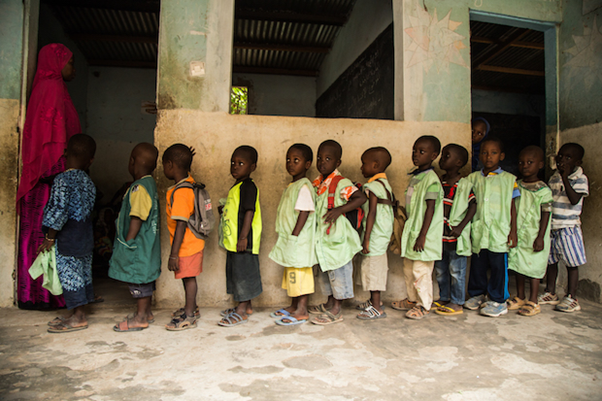


Support Us To Support The Girl Child
We are rolling out a four-year project called “Agenda Protect the Girl Child in Africa”.
Project Summary
The project has four strands to it:
Fostering an Africa Fit for Children: AU Watch’s Contribution To Agenda 2040
Progress, challenges and opportunities
As the new decade dawns, two child rights treaties are at a critical point of reflection upon their implementation.
The United Nations Convention on the Rights of the Child (CRC) and the African Charter on the Rights and Welfare of the Child have both reached their thirtieth anniversary yet remain more relevant than ever.
The CRC and the African Children’s Charter have empowered Africa’s children with inalienable rights. However, while much progress has been made on improving children’s health and education in Africa, stubborn challenges persist. Africa’s children now also face emerging global threats and challenges to their survival and well-being, such as attacks on civilians, climate- and conflict-related migration, urbanization, and the impacts of technology.
The African Children’s Charter
as a force for child rights
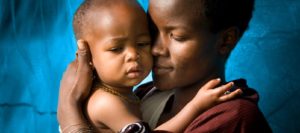 The African Children’s Charter complements or elaborates on some of the CRC’s provisions and also contains new areas that are not contained in the CRC such as the responsibility of the child (article 31) and protection against apartheid (article 26). Many countries report having developed laws on children following ratification of the African Children’s Charter.
The African Children’s Charter complements or elaborates on some of the CRC’s provisions and also contains new areas that are not contained in the CRC such as the responsibility of the child (article 31) and protection against apartheid (article 26). Many countries report having developed laws on children following ratification of the African Children’s Charter.
The African Children’s Charter is an important advocacy tool with Governments and has been referenced in a plethora of advocacy and campaign
strategies by various institutions. For example, the African Common Position on the African Union (AU) Campaign to End Child Marriage in Africa recognizes Article 21(2) of the African Children’s Charter
Role of the African Committee of Experts on the Rights and Welfare of the Child
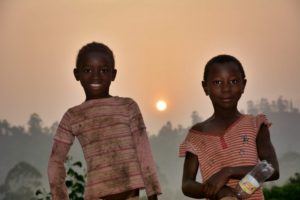 The African Committee of Experts on the Rights and Welfare of the Child (ACERWC) was established with
The African Committee of Experts on the Rights and Welfare of the Child (ACERWC) was established with
the distinct mandate to promote and protect the rights enshrined in the African Children’s Charter.
General Comments of the ACERWC elaborate on the African Children’s Charter and support States
Parties, and other stakeholders, in the effective implementation of specific articles. The ACERWC
has developed five General Comments on subjects including ending child marriage, and systems strengthening for child protection, and is in the process of developing a General Comment for the protection of children in armed conflict following a continental study. However, there is a need to raise the profile and status of the ACERWC to increase its effectiveness, by forging stronger links with other AU entities and gaining support for its Agenda for Children 2040: Fostering an Africa Fit for Children.
National progress on child rights through the African Children’s Charter
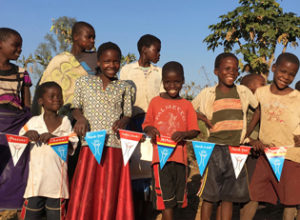 State Party reporting process
State Party reporting process
Definition of a child in Rwanda: The ACERWC recommended that Rwanda
engage in legislative reform to harmonize and define the age of children.9 In 2016,
Rwanda adopted the Persons and Family Law setting the age of majority at 18 years and the minimum age for marriage at 21 years.10
Harmful traditional practices in Tanzania: The ACERWC urged Tanzania to address harmful traditional practices.11 Tanzania launched a Child Marriage-Free Zone campaign and developed programmes for alternative sources of income for persons who perform FGM/C.12
Refugee children in South Africa: The ACERWC recommended that the Government of South Africa eliminate barriers to social services for refugee children.13 The South African National Action Plan for children (2019–2024) therefore includes a protocol to streamline delivery of services to these children.
Role of State Parties to the African Children’s Charter
The promotion of child rights in Africa is characterized by an array of actors who perform their
roles under different mandates and often cooperate in thematic or geographical partnerships.
The 49 States Parties to the African Children’s Charter are significant agents of child rights. The State Party
reporting process can enhance children’s rights at the national level. However, there is currently low participation in the reporting process.
Action points for a bold agenda
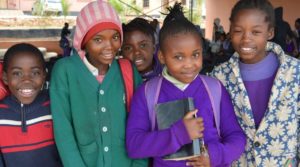 The African Children’s Charter remains purposeful and relevant, with the ability to foster changes in
The African Children’s Charter remains purposeful and relevant, with the ability to foster changes in
legislation, policy and practice in support of child rights. But only if it is widely known, widely used and widely respected.
Six action points are proposed to create a bold agenda to accelerate child rights in Africa:
• Action Point 1: elevate the status of the African Children’s Charter, ensure its universal ratification and the removal of reservations by States Parties.
• Action Point 2: respond to the continent’s emerging challenges to child rights through General Comments on the African Children’s Charter, research and advocacy, and crossratification of other relevant instruments.
• Action Point 3: increase reporting synergies between the CRC and African Children’s Charter for each State Party, with feedback consolidated into national and sub-national action plans for advocacy and implementation.
• Action Point 4: invest in the revision and enactment of child rights legislation and coordination mechanisms; the capacity of independent national human rights institutions; and adequate, accountable and transparent disbursement of social sector funding.
• Action Point 5: support statutory data systems, reporting and accountability, evidence generation
and knowledge sharing, and strengthening AU accountability mechanisms to deliver on child rights.
• Action Point 6: embed a whole-of-society approach – including the participation of children – into ideas creation for catalysing change for children.
There is also a need to harness seven essential elements (3 S’s – scale, speed and sustainability, and 4 I’s – investment, innovations, institutional
strengthening and implementation) across the action points and in the newly revitalised response.
As we mark the influence of the African Children’s Charter in its thirtieth anniversary year, there is cause to celebrate the contribution of the many actors who have supported its implementation, and the children who were born with the Charter firmly
in place to support and protect them. The time has come to ensure that the African Children’s Charter is robustly and comprehensively utilized in that
mandate, for every child in Africa.
ACERWC General Comment on Article 6 of the Charter on the Rights and Welfare of the Child
Article 6 of the African Charter on the Rights and Welfare of the Child provides:
The African Committee of Experts on the Rights and Welfare of the Child adopted this General Comment on Article 6 in April 2014 at its 23rd ordinary session, and a public launch event was held in February 2015 during the Third Conference of African Ministers of responsible for Civil Registration (09-13 February) in Yamoussoukrou.
Fourth Conference of African Ministers Responsible for Civil Registration: Nouakchott Declaration
The African Union Commission, with the support of the United Nations Economic Commission for Africa (ECA), the African Development Bank (AfDB), and the Republic Islamic of Mauritania, is organizing the Fourth Conference of African Ministers responsible for Civil Registration from 7 to 8 December 2017 in Nouakchott. More
Third Conference of African Ministers Responsible for Civil Registration: Yamoussoukro Declaration
The Third Conference of African Ministers responsible for Civil Registration was held on 12th to 13th February 2015 in Yamoussoukro, Côte d’Ivoire on the theme ‘Promoting the use of Civil Registration and Vital Statistics in Support of Good Governance in Africa.’’. The Conference was preceded by be a three-day Expert Group Meeting (on 9th to 11th February 2015) that deliberated on technical matters arising from the theme of the conference and engaged in the preparation of draft. More
PAP: Resolution on the Eradication of Statelessness in Africa
Welcomes the proposed draft protocol to the African Charter on Human and Peoples Rights on the specific aspects of the right to a nationality and the eradication of statelessness in Africa, and urges states to support its adoption and find immediate solutions for stateless persons and persons at risk of statelessness. More